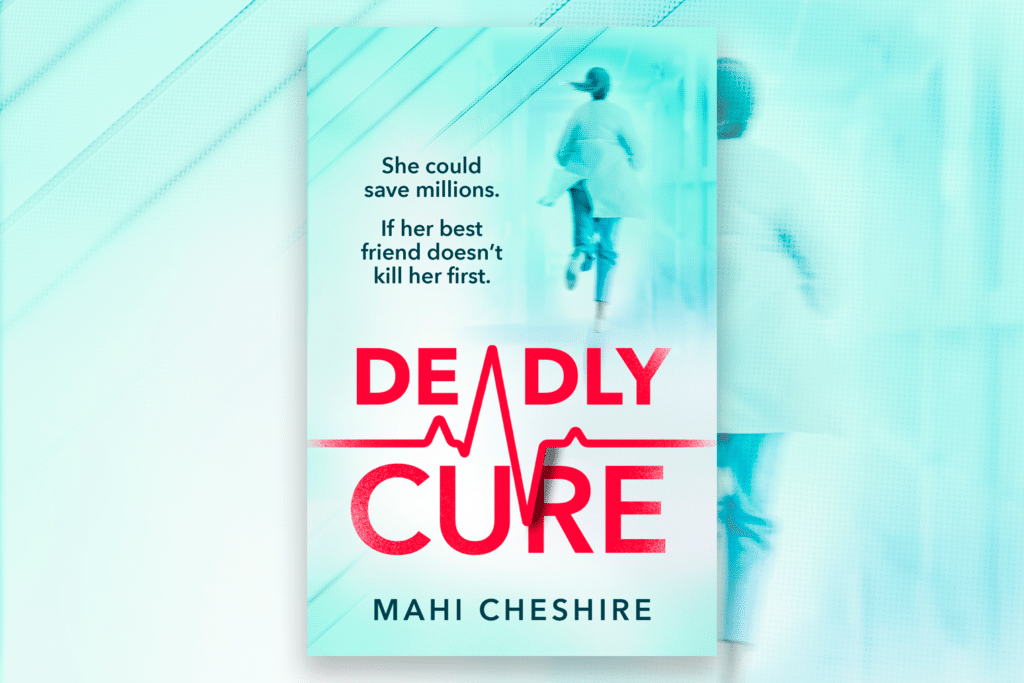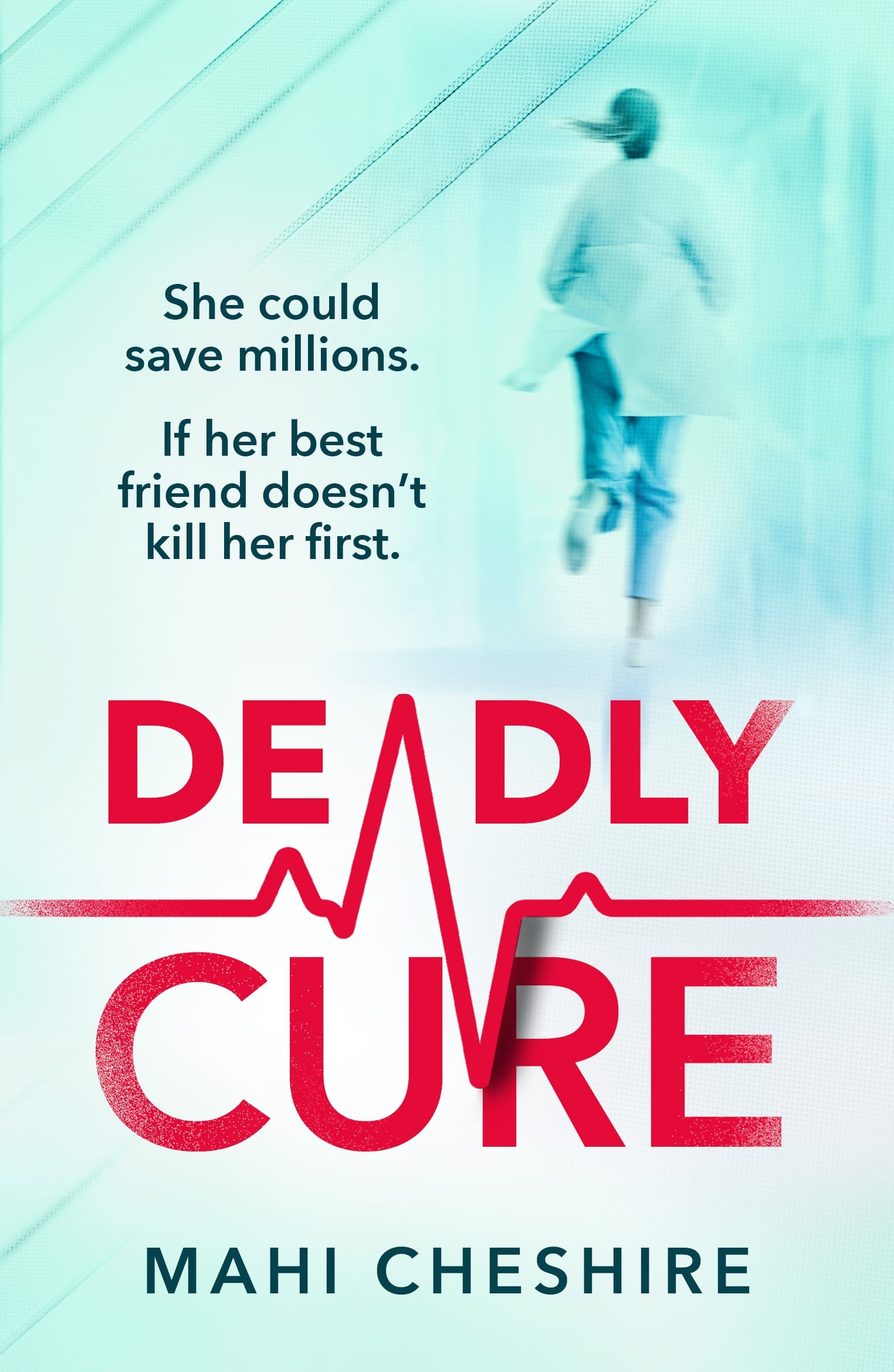Books
Extract: Deadly Cure by Mahi Cheshire
Deadly Cure is the debut novel by Mahi Cheshire. Perfect for fans of The Silent Patient and The Holiday, this is a heart-stopping thriller of betrayal, secrets and ruthless ambition.
Dr Rea Dharmasena is devastated when she loses out on her dream research job to her med-school rival and best friend, Dr Julia Stone. To add insult to injury, Julia used Rea’s own cutting-edge research to get it.
But just as Rea finds it in her to forgive the betrayal, Julia, after a life-changing medical discovery, is found dead.
Despite finding herself caught up in a murder investigation and a complicated new romance, Rea is finally happy; she has the dream job she’s always wanted. But at what cost?
Read on for the first chapter of Deadly Cure by Mahi Cheshire!
Deadly Cure
by
Mahi Cheshire
PROLOGUE
Rea
‘Adult cardiac arrest.’
My pager usually emits a bleeping noise. When it talks it only brings bad news. A staid female voice speaks amidst crackling static. ‘Adult cardiac arrest. Medical team to Emergency Department, Resus.’
I start running; out of the doctors’ office, down the stairs. Matt, the on call anaesthetist, follows me, his trainers squeaking as he runs.
In the foyer, we pass Khaled, the senior surgical doctor on call. His pager bleeps. ‘Trauma call. Surgical Team to Emergency Department, Resus.’
‘I wonder if it’s the same thing,’ I say as he starts running alongside us.
‘Maybe. Either way, looks like all the doctors in the hospital are going to be in the Emergency Department.’
Our soles skid as we sprint through a dark corridor. We’re on autopilot after a busy night shift, too tired to talk. It’s 6.30 a.m. and the hospital is just waking up. Staff arriving for day shifts walk past us in the opposite direction, thick winter coats buttoned over their uniforms. Through the glass doors of the main entrance, first light shows in a murky grey sky. There’s an off-kilter vibe, of darkness lifting over a day that’s not quite ready to start. As we run my mind returns to the same thing that’s been bothering me all night: Feng’s voicemail, at the beginning of my shift twelve hours ago. I need to talk to you when you’re home.
We race through the Emergency Department and barrel through the double doors into the resuscitation area. The large white tiled room is separated into four bays, the beds all empty. Light from the fluorescent overhead panels is unnaturally bright, the air smells sharp with the tang of disinfectant. In one of the bays, nurses and doctors in blue scrubs stand, chatting. The registrar, Bo, greets us. There are dark circles around his eyes.
‘What’s coming in?’ I pull on a plastic apron and latex gloves. The powder inside them makes my fingers itch.
‘Thirty-one-year-old male, cardiac arrest post road traffic accident.’
Matt looks up from his respiration equipment and whistles. ‘Poor guy. What else do we know?’ He fits together a big plastic balloon-like apparatus with a tube on the end which will ventilate the patient when he squeezes it.
‘It’s a trauma call with major haemorrhage and head injury. The C-spine isn’t cleared.’
This patient has multiple problems. But the priority will be to restart his heart before we can deal with any of the other potential complications. Fractures, internal bleeding, damage to the lungs or heart, any of the things that could have caused his heart to stop. I fill a cardboard dish with equipment for a blood test – syringe, alcohol wipe, green needle. Mechanically, because I’ve done this so many times that arrest calls have become mundane.
The doors to the ambulance drop-off point burst open. Cold air bites into my bare forearms below my short-sleeved scrubs. Three paramedics in dark green jumpsuits appear. One pushes a stretcher in, another runs alongside it as she squeezes a bag of blood into the patient’s veins. A third paramedic perches on the side of the stretcher, her torso moving up and down, dark brown ponytail swinging from side to side as she does chest compressions. The patient is largely obscured; all I can see is his right arm, long and streaked with dried blood. They come to a stop in front of us.
‘Thirty-one-year-old male hit a wall at high speed,’ says one of the paramedics in a matter-of-fact tone. ‘C-spine blocked. He’s had two units of blood and thirty minutes of CPR so far. We haven’t been able to get an ID on him yet.’
The nurses and doctors shift immediately into sixth gear. The room fills with movement and noise, people talking rapidly, multiple footsteps bustling over the tiled floor. The team gather around the stretcher and move the patient to the bed. A nurse cuts off his T-shirt. It might have been white once, but now it’s mostly soaked red. He attaches electrodes to the patient’s chest, ready to shock, and connects him up to winding leads that feed into a heart monitor. As soon as it connects, the trace on the screen shows a haphazard, squiggly line. A dangerously unstable heart rhythm. A nurse stands ready to take over compressions.
‘Twenty-eight, twenty-nine, thirty.’ The paramedic counts her in in a perfectly choreographed routine, and she takes over, moving up and down over the patient’s chest.
‘Analysing.’ The automated tones of the defibrillator, a machine which gives electric shocks to restart the heart, cuts through the thrum of activity.
‘Everyone stand clear!’ Bo shouts. The nurse stops compressions, we all take a step back to avoid electrocution.
‘Delivering shock.’
The shock is given, the patient’s chest heaves centimetres off the bed then lands with a thump. Bo feels for a pulse in his groin.
‘Nothing.’
‘Continue CPR.’ Bam, bam, the compressions start up again.
I squeeze through the people pressed around the bed as I prepare to take blood to test. I reach for the patient’s arm, streaked with dried blood. Then, I see. My knees feel weak. My hand shakes as I turn his wrist over, examining it. The glass front of the watch has been smashed, the silver hands hang askew, but still I recognise the birthday present I bought him last year. The needle falls from my hand. It clatters to the floor.
‘Hey, isn’t that one of the doctors?’ someone asks. There’s a sudden, palpable shift in atmosphere. People are crowding around to look now.
I need to know. I force myself to look at his face.
It’s immediately obvious why it took so long for the staff who work with him every day to realise who this patient is. A C-spine collar like a huge upended megaphone obscures the lower half of his face. There are big red plastic blocks either side of his head to stabilise his neck. His eyes are swollen shut, his face is smudged with blood. His usually immaculately styled black hair is matted and there are fragments of glass in it. He looks nothing like he should. Why is he here? He’s supposed to be tucked up in his bed in the flat we share right now, snuggled up to his boyfriend. My medic brain analyses the situation and I wish it wouldn’t. Only about eight per cent of cardiac arrests that happen outside of hospital are resuscitated successfully. He’s had at least thirty minutes of cardiac arrest, major trauma, head injury, blood loss. With all that, I don’t see how we can bring him back. Please, just be another male the same age. Anyone but him.
‘It’s Dr Tanaka,’ someone says. ‘It’s Feng.’ No, no, no. Bile builds at the back of my throat. The man on the stretcher isn’t another anonymous patient. He’s my best friend. There’s an uneasy buzz of voices around me now.
‘I can do that.’ Khaled takes the needle from me. I turn to the nurse about to finish another two-minute cycle of compressions.
‘I have to take over.’ My voice sounds hoarse.
‘Rea, no.’ Bo grabs my shoulders. ‘You’re too close to this. We have enough doctors, you need to step back and let us handle it.’
‘No!’ I fight as he moves me gently outside of the throng around the bed. The air is thick with the metallic odour of blood. The lights overhead seem even brighter than usual. I stand aside for a moment, strangely detached from my body, like I’m watching a scene happening to someone else. The team continue compressions. Matt stands at the head of the bed ventilating my best friend. They all keep it together, but they don’t know him like I do. He was the one I cried to when I was fourteen years old and my parents were separating. I was by his side when he came out to his family. Why is he here? And earlier, what did he want to talk to me about? He’d sounded panicked in his voicemail, in a way I’ve never heard before. It’s about Julia. Why did he mention her? After Julia, after everything that’s happened lately… Not him, too. Please, not him, too.
My vision blurs, hot tears run down my face. I push closer to the bed again, reach for a blood gas syringe, but a nurse moves me away. ‘Rea, get back.’
A single tone beeps. I look at the heart monitor. Then my legs give out as the trace flatlines.
CHAPTER ONE
Julia
Seven Months Earlier
June 4th
Met a hot guy. He was playing guitar in the bar on open mic night. He approached me after his set. There was something soulful about him, despite his stupid, ‘ironic’, Sugar Puffs T-shirt. I’m so glad I didn’t bat him off with my usual, made-up excuse about a boyfriend, because he works as a porter at the London Medical Institute. I think I’m going to have to see him again.
June 12th
Turns out hot bar guy, Krish, knows nothing about what happens in the London Medical Institute lab. But it doesn’t matter, because he has a porter’s access card. It’s been winking seductively at me from his wallet all week. Of course I want it. Question is, how to get it without getting caught?
June 14th
It was simple in the end. I suggested to Krish that we hook up at his workplace after hours. A covert flash of my new black lace bra and he was game, no questions as to why it had to be in the lab building. The promise of sex and he became instantly co-operative. Like most men. While he was putting his clothes back on, I had a look around. Now there’s a picture on my phone. Amelia Perez, whoever she is, should be more careful about where she leaves her lab book. Especially as it had ‘confidential’ stamped all over it. Now I know what their research is about. It’s bold, cutting edge, like nothing I’ve worked on before. I want the job more than ever. The problem is, I also now know that the presentation I had planned for interview is completely off-topic. While Rea’s is exactly right. And she doesn’t even have a clue. This job is perfect for me. It’s just so unfair.
June 16th
Something unprecedented happened today. Almost like the universe intervened on my behalf. I just got back from dinner with Rea. She organised it in an attempt to meet Krish. I pretended I would bring him to shut her up even though I had no intention of following through. I thought Rea would be on my case when she saw that I was alone, but she arrived at La Foglia holding a huge binder and her laptop and didn’t even seem to notice.
‘There’s not enough time,’ she said. No greeting, nothing else. The aura of stress around her was palpable as she opened the binder over our menus like we were at work rather than a candlelit restaurant.
‘For what?’
‘For me to memorise all this.’ She started flicking through articles she’d ripped out from recent journals.
‘Why do you need to memorise articles on medical imaging?’
She looked at me like I was an idiot to even ask. ‘I need to be clued in on recent developments.’
I couldn’t be bothered to ask her why she was so worked up about this random topic. I started eating the marinated olives that I’d ordered. Rea always comes out with it eventually. I listened to her talk me through an entire article on MRI scanning advances before ordering more food, even though I was starving. Rea had picked the place because she’d heard the food was amazing, but she hadn’t even looked at her menu yet.
Finally, she put down the binder. ‘Should I focus on one imaging modality for the presentation? Or cover a few?’
‘The presentation for the interview?’
She rolled her eyes. ‘What else?’
‘But you have already have a presentation.’
‘I’m not doing that anymore.’
I almost choked on an olive. ‘Why not?’
She smiled like she’d been waiting for me to ask. ‘Look at this.’ She flipped to an article from The Lancet and pointed to the author. Dr Owen Ansah. Our soon-to-be interviewer.
Future supervisor to whoever gets the research job.
‘He wrote about the topic. So maybe it’s related to what they’re researching on the project.’
She was so far off course. Rea’s overthinking is excessive at the best of times, but this was ridiculous.
‘I doubt it. That paper is three years old.’
‘I want to do something different. Everyone else will present on their PhDs or their master’s projects. I’m going to show I can produce a good presentation, without having had to study the topic for years like they have.’
Amelia’s lab notes flashed across my brain. Oncolytic viruses. Their project is on Rea’s PhD topic. She has the perfect presentation already.
‘I’m trying to think outside of the box. No one else will pick medical imaging. Dr Ansah might like it.’
My throat went dry and I started coughing.
‘What is going on with you today? Here.’ She poured me a glass of water.
I drank it in one go while Rea studied her menu.
‘So? You think he’ll go for it?’ she said.
‘I don’t know.’
‘It’s a risky move. Is it a bad idea?’
All this past week I’d been toying with the idea of suggesting she change her topic, but couldn’t bring myself to wilfully sabotage her. By doing medical imaging, she would effectively be sabotaging herself. I remembered something Mum used to say, about having an angel and a devil on each shoulder. I never believed in all that. If it were true, the angel would have screamed at me to tell Rea about Amelia’s lab notes, to convince her not to change her presentation. But I really want the job. I need it more than her. Because of Amy.
‘Medical imaging sounds great,’ I said. I motioned to the waiter. ‘We’d like to order.’
There’s not much angel in me, anyway. The devil part was always going to win.
Enjoyed the first chapter of Deadly Cure by Mahi Cheshire? Let us know in the comments below!



Please note: Moderation is enabled and may delay your comment being posted. There is no need to resubmit your comment. By posting a comment you are agreeing to the website Terms of Use.